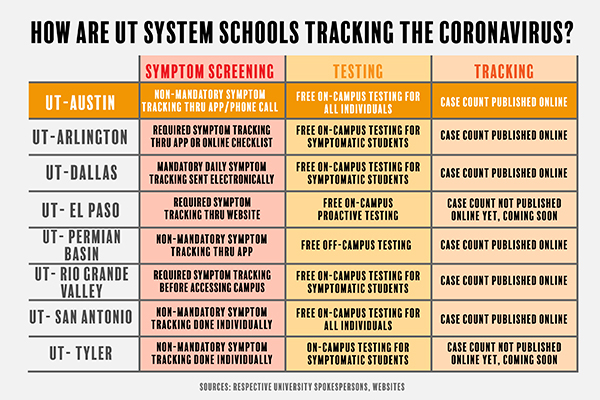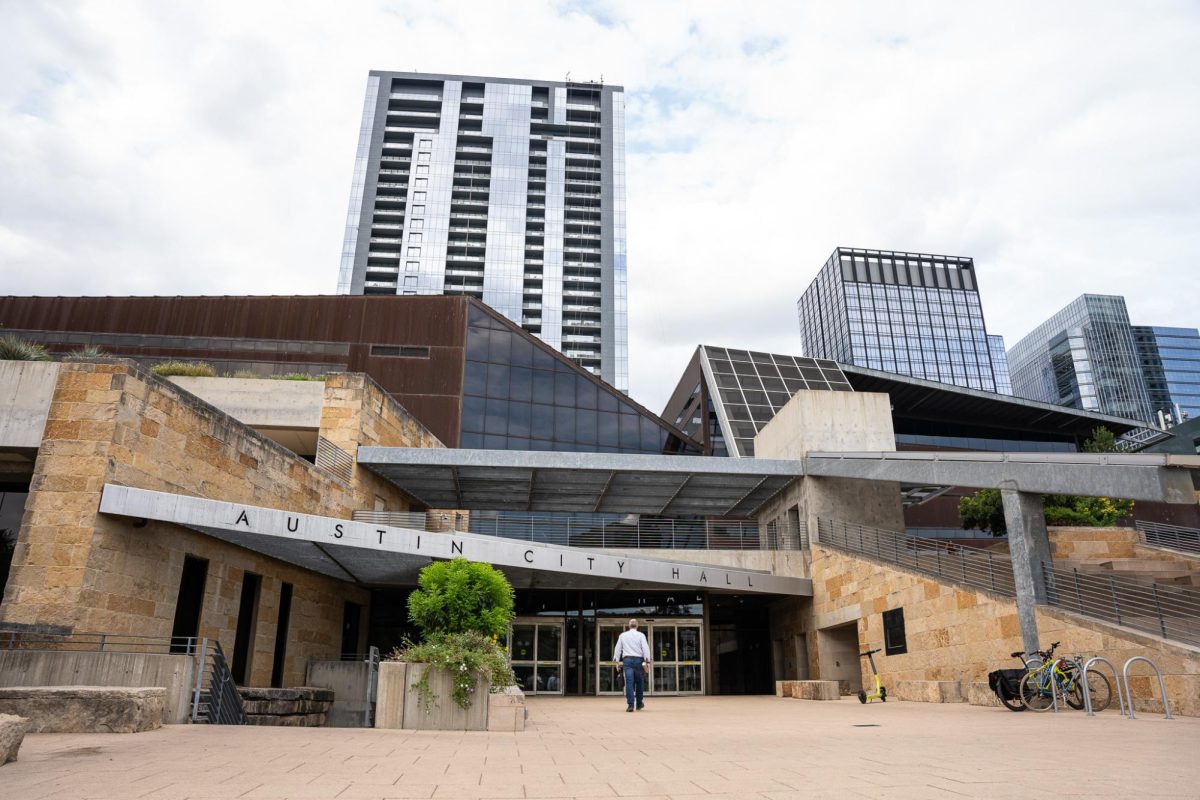UT System academic institutions developed individual approaches to decreasing the spread of COVID-19 as they open campus this fall. The Daily Texan gathered information from all the institutions on how they are screening community members for COVID-19 symptoms, testing for the virus and reporting case numbers.
Although the UT System made the decision to move all academic institutions online in March for the spring semester, UT System spokesperson Karen Adler said changes to instruction delivery will be made at the campus level this fall. She said the systemwide move to online instruction in March was “necessary and appropriate at the time.”
“We expect decisions on whether to change delivery to be made on a local basis, where the campus and health experts are most aware of each institution’s situation and experience,” Adler said in an email. “Any such decisions would be made in consultation with the UT System and public health officials, taking into account many factors in the campus community.”
Adler said UT’s academic institution’s presidents meet weekly with UT System Chancellor James Milliken to provide updates about COVID-19 on their respective campuses. She said Milliken and his staff communicate with campuses daily about COVID-19 testing, precautions, policies and cases.
UT-Austin
UT-Austin community members are asked, but not required, to track their symptoms via the Protect Texas Together app or by dialing into the service line, according to the Protect Texas website.
The University is offering testing to symptomatic and asymptomatic members of the community, according to previous Texan reporting. Tests are covered by insurance or free for students.
An online dashboard publishes daily COVID-19 cases updates and results of proactive community testing for the University. As of this story’s publication, the dashboard shows 138 cases within UT faculty, staff and students since school started Aug. 26.
UT-Arlington
Students, faculty and staff at UT-Arlington are asked, but not required, to measure their temperatures daily and monitor potential COVID-19 symptoms, according to the University website. Those who are in close contact with infected individuals are required to complete a form reporting the exposure and follow subsequent health guidelines.
UT-Arlington’s on-campus testing is available for students with COVID-19 symptoms, according to the website. Students will not pay any out-of-pocket costs.
UT-Arlington is publishing a total count of COVID-19 cases on their website, which is currently at 32 since March 14.
UT-Dallas
UT-Dallas students and employees are required to complete a health screening sent electronically every morning before going on campus, according to a UT-Dallas news release.
Students with COVID-19 symptoms can get tested on campus, said Rafael Martín, UT-Dallas vice president and chief of staff, but the University is currently not testing asymptomatic individuals. Tests are charged to student insurance, he said.
UT-Dallas is publishing a list of COVID-19 cases on their website that shows whether the individual was a student, faculty or staff member, as well as what buildings they visited.
UT-El Paso
UT-El Paso will not test individuals with symptoms, and instead tests asymptomatic students and employees daily on a random opt-in basis, UT-El Paso spokesperson Victor Arreola said. The program is intended to identify positive individuals who may not know they have the virus, he said.
Students, faculty and staff who come to campus are required to complete daily symptom screening and reporting information on a web application, Arreola said.
UT-El Paso currently does not publish a COVID-19 case count, but is sharing information with the city health department daily and to media outlets upon request, Arreola said. The University plans to publish cases online in the coming weeks, he said.
UT-Permian Basin
UT-Permian Basin is using an app called #CampusClear for community members to track symptoms, Tatum Hubbard, chief of staff of communications for UT-Permian Basin, said in an email. Tracking symptoms is not required, she said.
While UT-Permian Basin is not offering test services on campus, the University has partnered with a local health provider for free student testing, Hubbard said.
The University has been keeping a count of active COVID-19 cases on their website since Aug. 15.
UT-Rio Grande Valley
Students and employees are required to perform daily symptom screenings before accessing campus, UT-Rio Grande Valley spokesperson Patrick Gonzales said in an email.
The University has four testing sites throughout the Rio Grande Valley where community members can get tested, Gonzales said. Testing is free and available to individuals who are symptomatic or have a compelling reason to get tested, such as students with clinical assignments, he said.
UT-RGV is publishing the number of weekly confirmed COVID-19 cases and tests performed on their website.
UT-San Antonio
UT-San Antonio community members are expected, but not required, to complete daily health assessments on COVID-19 symptoms, Courtney Clevenger, assistant director of strategic communications for UT-San Antonio, said in an email.
UT-San Antonio is offering free on-campus testing to the community, regardless of if they have symptoms, according to the University COVID-19 website.
UT-San Antonio is publishing a count of COVID-19 cases and students in isolation or quarantine on their website, which is updated daily by 4 p.m.
UT-Tyler
UT-Tyler students are expected to self-monitor for symptoms, UT-Tyler spokesperson Lucas Roebuck said in an email. UT-Tyler initially screened around 1,700 students for symptoms before they moved into campus last month, he said.
UT-Tyler is offering on-campus COVID-19 testing for students who have symptoms or believe they were exposed to the virus, Roebuck said. UT-Tyler did not respond to requests regarding if tests were free or available for asymptomatic students by the time of publication.
UT-Tyler is publishing a COVID-19 case count online starting Sept. 8, Roebuck said.





















